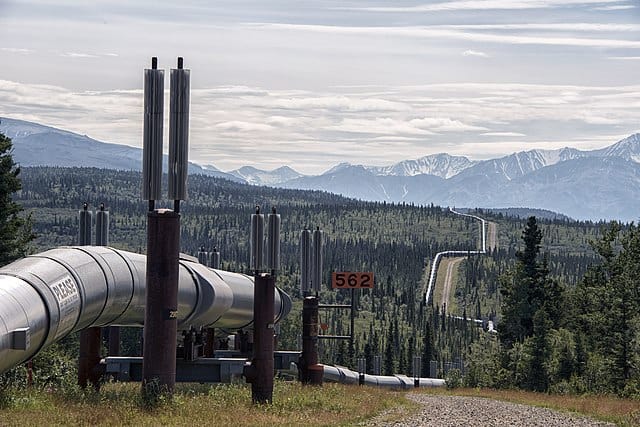 Trans-Atantic Pipeline in Alaska. Gillfoto, CC BY-SA 4.0 via Wikimedia Commons
Trans-Atantic Pipeline in Alaska. Gillfoto, CC BY-SA 4.0 via Wikimedia Commons
As the Biden Administration escalates its crusade against American energy from D.C., perhaps no state has more to lose than Alaska, where the oil industry and its tax dollars are responsible for up to a third of the state’s economic output and a quarter of Alaskan jobs. But this year in Juneau, lawmakers are considering taking a page out of Biden’s playbook with a suite of harmful new taxes on this pivotal industry. Unless Governor Mike Dunleavy and commonsense Republican and Democratic legislators intervene, ill-considered tax hikes on oil are sure to drive away production and investment to the Lower 48 and overseas, with consequences that will reverberate across the nation.
Thanks largely to the foresight of Speaker Cathy Tilton and a newly conservative House majority, no tax increase passed the legislature before lawmakers adjourned for the year. Still, with Alaska facing a budget deficit of around $700 million, a wide array of proposals for new and higher taxes has dominated the policy conversation in Juneau this session. Ideas have included a whopping 40% tax hike on oil and gas production companies by nearly halving the per-barrel tax credit, while other targeted taxes would penalize smaller and medium-sized energy companies who do business in the state.
But Alaska’s budget already depends overwhelmingly on revenue collected from the oil and gas industry. In fact, the state is only facing a budget deficit due to lower-than-projected oil prices: every dollar in volatility in oil prices equates to approximately $70 million in tax revenue gained or lost. Around 80% of the state budget has long relied on oil revenue. Additionally, energy profits are the reason for the formation and success of Alaska’s Permanent Fund, a $76 billion investment fund that provides annual “dividends” to state residents while helping to fund government operations.
Although Texas has a higher combined tax and royalty rate than Alaska, producers in the Lone Star state make more than twice as much as those in Alaska, thanks to higher production and transportation costs. In practice, the Alaska government receives a higher percentage of pre-tax profits than Texas. And that does not even account for Alaska’s 9.4% corporate tax rate levied on nearly all oil revenue, whereas Texas does not have any corporate income tax at all. It is clear that ordinary Alaskans understood the implications of these realities in 2020, when voters overwhelmingly defeated a major oil tax hike on the ballot by a 15-point margin.
Taxing oil and gas companies may seem like a simple, innocuous solution to solve Alaska’s budget deficit. But it is unwise to penalize companies that have chosen to invest billions in new Alaskan production ventures. Forcing profitable drilling ventures to shoulder a heavier tax burden, whether targeted or industry-wide, is a signal for them to pivot to friendlier economic environments like the oil-rich states of Texas and North Dakota. As companies respond to higher taxes by scaling back investment, Alaska’s revenue woes will only grow worse in the years to come, and Alaskans will pay the price through lost jobs and stunted economic growth.
To the objective observer, massive oil and gas tax hikes (such as those proposed in SB 114) constitute a poorly disguised attempt by environmentalists to implement a radical anti-energy agenda, using temporary state budget challenges as leverage to cripple an industry they vehemently oppose. Raising taxes on energy production threatens the future of existing and up-and-coming drilling projects, including Willow and Pikka on the North Slope. But for environmentalists who are dogmatic in their quest to end oil drilling altogether, this is precisely the outcome they seek, regardless of the cost to Alaskan livelihoods or even the long-term future of its once-thriving economy.
In March, lawmakers in Juneau demonstrated remarkable unity in favor of the Willow oil project. Despite angering his base of climate activists, President Biden approved the Willow project after every single state legislator signed onto a unanimous letter of support – personally delivered to the President with the support of Alaska’s entire congressional delegation – that highlighted the “enormous benefits that development of oil and gas resources … would bring to local communities, tribal governments, the state, and the nation.” Alaska elected officials should hold on to that unity in the face of a tax increase that would put the economic benefits of new production at Willow in serious jeopardy.
Indeed, these taxes would strike at the heart of Alaska’s economy, where oil and gas directly generate more than $12 billion in GDP and nearly $5 billion in annual employee income. Even more insidiously, certain provisions of this proposal would unfairly target small and medium-sized businesses, which make up the backbone of Alaska’s economy and play a major role in bringing new jobs and capital investment to the state.
Rather than pile new tax liabilities onto companies that have contributed so much to Alaska’s economic success, a pro-growth policy solution could involve cuts to the state’s fourth-highest corporate tax rate of 9.4%. For businesses looking to bring jobs, resources, and investment to Alaska, that tax rate presents a major obstacle, forcing them to accept a financial tradeoff just for the privilege of doing business in the state. Solving Alaska’s fiscal future depends on facilitating economic growth through commonsense reforms like these, rather than leaning on taxes that hobble production, choke off new investment, and lower state revenue collections.
As one of 18 state governors who has signed the Taxpayer Protection Pledge, Governor Mike Dunleavy has repeatedly proven himself to be a capable conservative, demonstrating an uncommon fortitude to resist harmful new taxes on his constituents even under significant political pressure. Now is the time for Gov. Dunleavy and conservative leaders in the legislature to ensure that these ill-conceived, anti-business, anti-energy tax hikes are not revisited.

